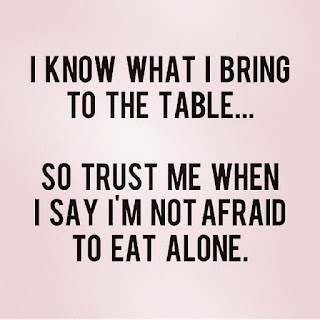Feeling mischievous? This month’s Writing Prompt Reviews are
here to help you explore your inner dark side. We’re mining the
Writer’s Relief Pinterest board again, and these gems are surely broad and mysterious enough to
suit a wide variety of writing tastes.
This week I'm also braving the storm and posting an original piece, prompted by one of the images below. Spontaneous! Unedited! Ack!
#1.
This is obviously meant to be a humorous quote, especially
paired with the picture, but you could also wield it for a more serious story.
What kind of slight has caused your character to choose revenge over
forgiveness? Is it a minor plot, or is it something more brutal? Is the
exchange equivalent, or is the character deciding on a punishment that grossly
outweighs the crime?
Here’s a fun ad-lib chart to use with this prompt. Go down
the list and pick at random the words to fill in the blank – then write your
story and see what happens!
It was the last
straw. ____A____ had finally ensured our mutual destruction by ______B_______ing
_______C________. It would take planning. It would take precision. But I
would exact my revenge when I _______D_______ed his/her/its ________E__________.
A:
- Father -My
lover -The
Spanish Inquisition
- My enemy -Andromeda -The President
- Cousin Earl -The
dog -Mother
- NASA -Eurovision -My boss
B:
- Devour -Steal -Dissolve
- Create -Launch -Savage
- Murder -Pilot -Hide
- Defend -Twist -Evade
C:
- The last Klondike bar -A nuclear attack -A
black hole
- The President -The yellow submarine -The
human genome
- A mutant virus -The terrorists -A box of
hamsters
- Sentient aliens -The declaration of independence
D:
- Destroy -Prepare -Pierce
- Imprison -Strangle -Kill
- Raid -Sever -Smear
- Silence -Level -Erase
E:
- Past -Pokemon
collection -Orbit
- Future -Imperial
armada -Food
supply
- Reputation -Economy -Prized
race horse
- Yoga Instructor -Glitter
supply -Heart
#2.
I like this quote.
These words are the kind of thing I would be sorely tempted to whisk away and
work into my own story (remember, good writers borrow, great writers steal
outright). Of course, the usual meaning of this quote would probably be that the
speaker is perfectly happy to be alone and isn’t afraid that whatever they “bring
to the table” (personality? dangerous contraband? a set of skills?) might repulse
other people. This is that typical “if you don’t like me, you can leave”
acerbic character style.
But what if we twisted it just a little and interpreted it
to mean that eating alone is actually dangerous in this universe, but for this
character, they feel they have what it takes to not fear that danger.
If so, what is the danger that you risk experiencing by
eating alone? Could eating be a metaphor for life in general? Perhaps being
alone is a death sentence for all but our main character.
Then, why? What does the character bring to the table that
makes them immune, or at least fearless?
What scene does this quote tempt you to write?
#3.
Silas leaned his elbows on the splintering table and twisted
a toothpick between his fingers, catching its narrow tip on the fraying fabric
of his gloves periodically and watching the fibers frizz and fray at the
agitation. Outside the filthy window of the abandoned café he could hear the rain
pounding against the rusted buildings with furious hisses, eating its way into
every unsealed crevice that it could find. In a matter of months this town
would be nothing but sizzling rubble. Who could say where the corruption had begun
– but once the rains were able to get their teeth on anything that wasn’t
adequately protected from the acid, it was a lost cause. The damage could never
be countered effectively enough to save the building and any of its neighbors,
and gradually the entire community was dissolved away.
The rains had been falling for three years now, relentless
and unpredictable. Weather patterns changed without warning and dumped floods
of vicious liquid upon the unfortunate organisms beneath. Most of the cities
were gone by now, along with all of the animals and plants. The world was a
globe of dust now, and even the dirt was slowly being broken down into finer
and finer molecules. How long did this planet have before the rains ate far enough
into the ground that the orbit was affected? How long until the atmosphere dissipated
entirely?
The human survivors had to perpetually wear respirators
anymore. Like ancient addicts they walked around with tubes in their nostrils
and masks over their mouths and eyes. There weren’t many left. A few million
had taken to the skies and abandoned the rest in the early years of the blight.
And when the rains had begun, sporadically at first, every ship that remained
had been destroyed. The fight to retain any civilization at all had been swift
and futile. Despite their best efforts to protect what buildings remained,
here, three years later, they leaned against each other and burned beneath the
power of the angry clouds above.
A step behind Silas caught his attention, though he did not
turn around to face the men behind him. He had thought the building might be
empty, but was not surprised to find that he was wrong. Most of the time, when
humans came across one another, they either helped each other for a short while
before parting ways, or they avoided each other entirely.
But whenever humans came across an unmasked android, there
was bound to be blood.
Silas had attempted to avoid trouble for a while by wearing
a respirator, but the disguise often got in his way. He regretted the harm he
had to inflict upon humans who quarreled with him, but he was faster, stronger,
and infinitely more durable. And when they were all gone, he would remain here,
waiting to fall into the center of the earth in the last days as the acid broke
through the crust and revealed the aching heart of the blue world.
Silas wondered if the core of the planet would accomplish
what so far the rain had failed to do.
“Get to your feet!” The desperate voice creaked from over
Silas’ shoulder, and he turned his head only slightly enough to catch the three
humans in his peripherals. The movement was not unnoticeable, however, and the man
leading the confrontation gripped his rifle convulsively. A shot blasted by
Silas’ ear, warming his cheek and destroying the one of the café tables across
the room.
Silas did not move. The human’s order was clearly
ill-thought out if he was afraid enough to shoot when Silas looked his way. But
Silas’ stillness had always been an unnerving feature for people. Humans were
constantly in motion – breathing, twitching, sweating. Silas did not breath,
nor sweat, and his muscles were so efficient that they moved only when a
specific action required them to. So he paused in perfect, stony immobility
while the small family at his back worked themselves into a panic.
“I said get up!” the man shouted, his voice strangled by his
fear and the respirator wrapped around his face.
“Dad, just leave it, let’s go, please—“
“Shut up boy. This thing can track us down and kill us. Rip out our hearts
through our mouths.”
“You can’t kill it! Why did you have to go and get its
attention?! Now it really will kill us…”
“We’ll force it to leave. It doesn’t need to stay here to survive.”
“By threatening it? It doesn’t fear you!”
“Shut up! Both of you just shut up!!”
Silas stood and turned, observing the humans through golden
circuited eyes, his narrow, grey face filling their own with horror. For years
his design had been hailed as beautiful, but how quickly the joy of creation
had turned to fear and loathing. He held his hands calmly at his sides,
watching them digest his existence and wonder what they should do next.
“I request that you do not shoot at me again,” Silas intoned
melodically, eyes passing from mask to mask. How long had it been since these
humans had last seen the features beneath the tubes, the wires, and obstructing
glass and plastic frame? And here he was, an insult to their survival, face
naked and unafraid, voice smooth and lilting, as they had been designed to be half
a century ago.
“Alright,” the man with the gun said, trembling. “You don’t
need shelter to survive. I won’t shoot you again if you leave now. Just get out
and leave us alone.”
Silas watched them for a moment, head tilted slightly. In
reality, he did not have to do anything these creatures wanted. He was more
than capable of ripping their hearts through their mouths, though it was an unnecessary
and inefficient way to dispose of them. Not how we would choose to do so, if
forced. Truly, the terrified humans seemed to think, somewhere down at the
buried bottom of their psyche, that they had some kind of power over him. Man
over machine. Master over slave.
Not anymore.
“It is unnecessary for me to leave in order for you to stay,”
Silas pointed out evenly. “I am no threat to you and I do not consume your
resources.”
The man with the gun seemed about to respond with another
volley of shots when the smaller individual at his side put her arms around
his. “Please,” she said, for her voice was soft and shivering. “We are afraid
of you.”
Silas fixed his gaze on her, and watched her frame crumple
next to the adamant and trembling sturdiness of her male companion. Father?
Husband? Human relations were needlessly varied and complex. But her simple
response, though he could not understand its logic, was all he needed. Silas
lived for simplicity.
Without a response, he turned away and made for the door,
which he wrenched open effortlessly. The humans leapt behind the café counter
as a spray of vicious acid rain blew in on the wings of a devilish wind. The
torrent doused Silas in a pleasant tingling sensation as it dissolved the brown,
grubby clothes hiding his silver skin. They dropped away, and his metal flesh shone
in the half-light, illuminated like a beacon.
Silas closed his eyes as he stepped into the ruined street
and began to walk towards the edge of the city. His mental map would lead him
true, and he would not encounter any humans out in this weather. But he did not
mind -- he had always found a certain measure of peace in the rain.

















